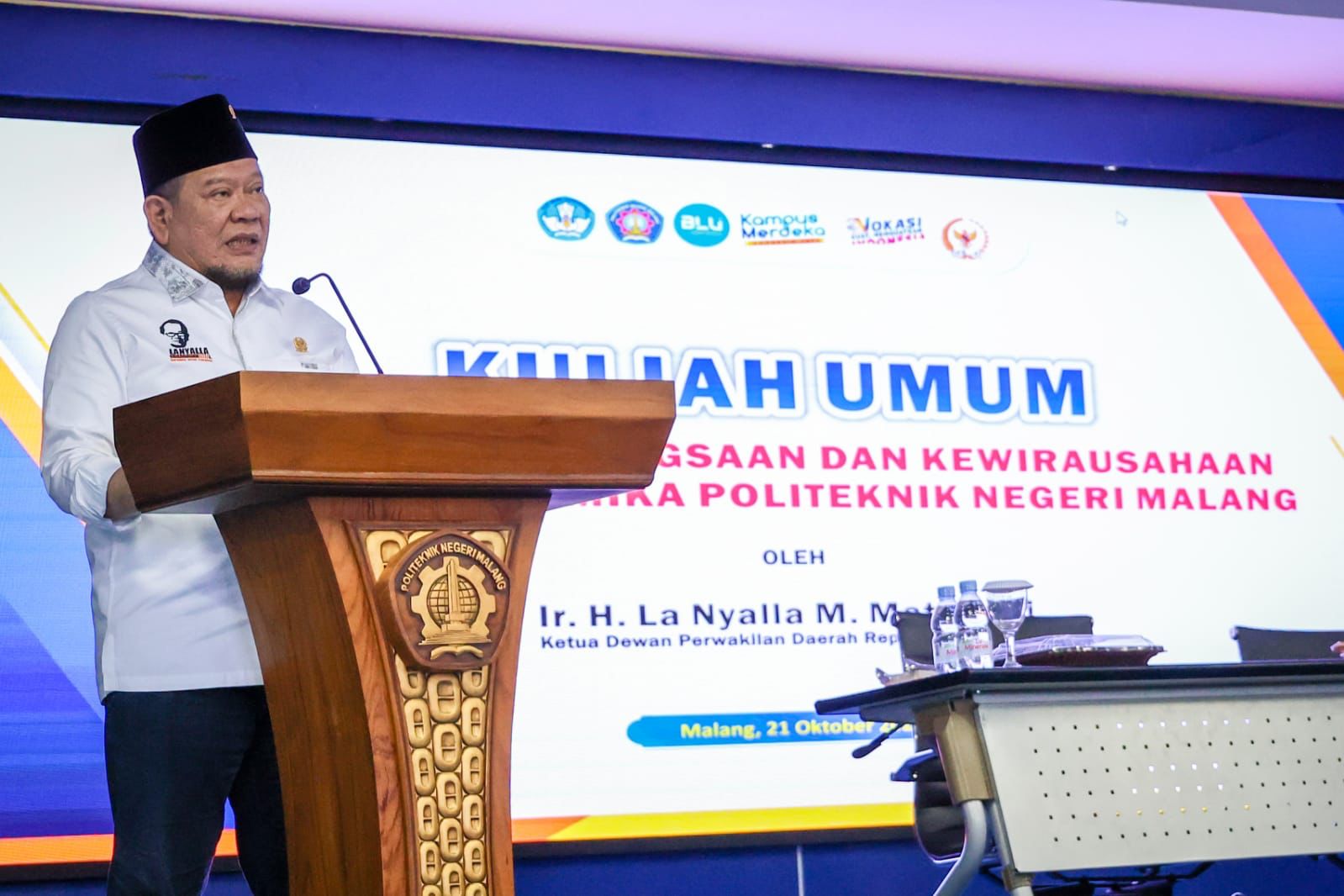Informasi Seputar Kegiatan di DPD RI
AGENDA KEGIATAN
DEWAN PERWAKILAN DAERAH REPUBLIK INDONESIA
21 October 2022 oleh admin
MALANG, dpd.go.id - The Chairman of the DPD RI, AA LaNyalla Mahmud Mattalitti, said that the current development is not Indonesian development, but development in Indonesia.
This was emphasized by LaNyalla when giving a Public Lecture with the theme National Insights and Entrepreneurship, at the State Polytechnic of Malang (Polinema), Friday (21/10/2022).
Figures present at the event were the Director of the Malang State Polytechnic, Supriatna Adhisuwignjo, ST, MT, the Deputy Directors, the Chair of the Senate and the ranks, the lecturers and students of the Malang State Polytechnic. Meanwhile, the Chairman of the DPD RI was accompanied by the Chairman of the East Java Province Chamber of Commerce and Industry, Adik Dwi Putranto.
LaNyalla recalled President Soekarno's message at the beginning of independence regarding how the state manages the wealth of natural resources. According to him, Bung Karno once said, let the reserves of natural wealth in Indonesia be buried first, while waiting for the sons and daughters of Indonesia to be able to manage them with their expertise.
"This means that the basic conception of Indonesia's development should indeed involve children who have the skills and skills to be involved in the development of their nation. That is the ideal formulation that should be implemented," said LaNyalla.
He explained that the national interest of a country, especially in the economic context, is above all else. This is what made the founding fathers design Indonesia's economic system as a country that has a comparative advantage, which is different from the system applied in Western and Eastern countries.
"Indonesia's economic system is known as the Pancasila economic system. In essence, the state must have full power over the earth and the water and the wealth contained therein. Including control of production branches that are important for the livelihood of many people," he said.
The senator from East Java continued, there are three main pillars that drive the wheels of the Indonesian economy, namely cooperatives or people's businesses, state and private companies, both national and foreign.
"Of course with a clear division, between the public goods area, which absolutely must be controlled by the state and the commercial goods area for the private sector, as well as the intersection between the two that combines joint work. So that a joint business process occurs," explained LaNyalla.
The concept is contained in Article 33 of the original text of the 1945 Constitution and its explanation, before the constitution was completely changed from 1999 to 2002. The amendments made the breath and concept of the national economy more inclined to a capitalistic liberal economic system. The economic mechanism was left to the market.
"As a result, each person who owns capital is getting richer, including foreign capital. The state no longer has absolute control over the earth and water and natural resources," said LaNyalla.
The state only functions as a licensor for concessions granted to national private companies who have already shared shares with foreign private companies. The state relied on very small taxes and royalties from these companies.
"This is the concept of economic growth, where the state should not be involved in the market mechanism. Of course, it is very different from the concept of economic equality designed by the founding fathers of the nation," he explained.
In fact, a country with a comparative advantage in natural resources, such as Indonesia, should prioritize Non-Tax State Revenue or PNBP rather than people's taxes.
The former Chairman of the East Java Chamber of Commerce and Industry gave an example of the construction of a smelter so that nickel mining companies do not export raw nickel abroad. According to him, it was a Chinese company that built the smelter, bringing in workers from China.
"So, if it says Tesla has agreed to buy processed nickel from Indonesia, it means that Tesla bought it from the Chinese company, which happened to have permission to drain the nickel in Indonesia," LaNyalla explained.
While the state only gets taxes from companies. Then they get very small royalties from mining nickel, and get levies from export duties.
"This is why Indonesia's state budget is always minus. So it must be covered with foreign debt with very high interest rates," said LaNyalla.
In fact, said LaNyalla, building a smelter only costs around Rp. 10 trillion to Rp. 20 trillion. The state must be able to build it on its own, because the allocation to build toll roads, bridges, dams at the PUPR Ministry is hundreds of trillions of rupiah every year from the state budget.
"The concept and economic system designed by the founding fathers of the nation is not that. That is why I offer the idea of a democratic system and economic system that is most suitable for this nation. And, we must return to Pancasila," said LaNyalla. (*)
AGENDA KEGIATAN
DEWAN PERWAKILAN DAERAH REPUBLIK INDONESIA
